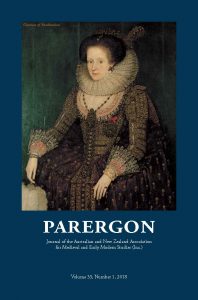 The ANZAMEMS’ journal Parergon (https://parergon.org/) produces one open issue and one themed issue annually. We now call for proposals for future themed issues, specifically for 2021 (38.2)
The ANZAMEMS’ journal Parergon (https://parergon.org/) produces one open issue and one themed issue annually. We now call for proposals for future themed issues, specifically for 2021 (38.2)
Recent themed issues include:
- 2016, 33.2 Approaches to Early Modern Nostalgia, guest-edited by Kristine Johanson
- 2017, 34.2 Exile and Imprisonment in Medieval and Early Modern Europe, guest-edited by Lisa Di Crescenzo and Sally Fisher
- 2018, 35.2 Translating Medieval Cultures Across Time and Place: A Global Perspective, guest-edited by Saher Amer, Esther S. Klein, and Hélène Sirantoine
Parergon publishes articles on all aspects of medieval and early modern studies, from early medieval through to the eighteenth century, and including the reception and influence of medieval and early modern culture in the modern world. We are particularly interested in research that takes new approaches and crosses traditional disciplinary boundaries.
Parergon asks its authors to achieve international standards of excellence. The article should be substantially original, advance research in the field, and have the potential to make a significant contribution to the critical debate.
Parergon is available in electronic form as part of Project Muse, Australian Public Affairs – Full Text (from 1994), and Humanities Full Text (from 2008). Parergon is included in the Clarivate Analytics Master Journal List of refereed journals and in the European Reference Index for the Humanities (ERIH), and is indexed for nine major database services, including ABELL, IMB and Scopus.
Themed issues contain up to ten essays, plus the usual reviews section. The guest editor is responsible for setting the theme and drawing up the criteria for the essays.
Time line
Proposals for the 2021 issue (38.2) should be submitted to the Editor susan.broomhall@uwa.edu.au by Friday 1 February 2019.
Proposals should contain the following:
- A draft title for the issue.
- A statement outlining the rationale for the issue.
- Titles and abstracts of all the essays.
- A short biographical paragraph for the guest editor(s) and for each contributor.
Proposals will be considered by a selection panel drawn from the Parergon International Editorial Board who will be asked to assess and rank the proposals according to the following criteria:
- Suitability for the journal
- Originality of contribution to the chosen field
- Significance/importance of the proposed theme
- Potential for advancing scholarship in a new and exciting way
- Range and quality of authors
Guest editors will be notified of the result of their application by the beginning of April 2019.
The editorial process
Once a proposal has been accepted:
- The guest editor will commission and pre-select the essays before submitting them to the Parergon Editor by the agreed date (for issue 38.2, 1 June 2020).
- The Parergon Editor will arrange for independent and anonymous peer-review in accordance with the journal’s established criteria.
- Occasionally a commissioned essay will be judged not suitable for publication in Parergon. This decision will be taken by the Parergon Editor, based on the anonymous expert reviews.
- Essays that have already been published or accepted for publication elsewhere are not eligible for inclusion in the journal.
Please send enquiries and proposals to the Editor, Susan Broomhall, at susan.broomhall@uwa.edu.au
[gview file=”https://anzamems.org/wp-content/uploads/2018/11/Parergon_Call-for-Themed-Issues.pdf”]
